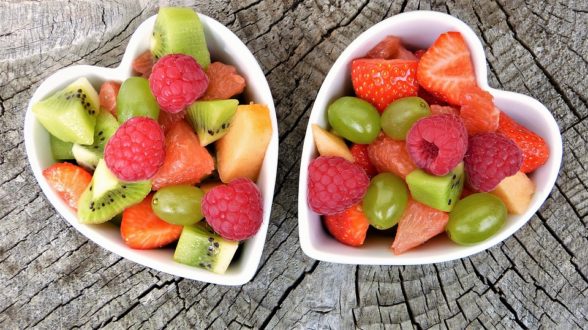It's officially Heart Month at the American Heart Association, so we wanted to share some helpful tips for ourselves, our students and our families.
Most of us aren’t just Spinning® instructors; we’re parents too. When it comes to feeding our family and juggling a busy schedule, it’s easy to fall into the trap of frozen, processed food or anything that can be prepared quickly. While these foods may be quick to prepare, don’t expire for months and quite tasty, they are often pumped with sodium, preservatives and unnatural flavor additives that can increase blood pressure and result in weight gain 1.
According to the Centers for Disease Control, cardiovascular disease (CVD) has been the number one cause of death every single year in the United States since 1918. One in four people succumb to heart disease, and it has significantly increased in many other countries over the past decade2. The good news is more and more studies reveal which foods can positively impact our cardiovascular health. Enhancing our diets by eating heart-healthy foods could actually prevent CVD and may prevent us from having to take medications in the future.
Obviously, consistent exercise at aerobic intensities like Spinning greatly reduces the risks of CVD. But for the times that we aren’t exercising, eating a variety of nutritious foods is a key factor for boosting heart health. Not only do these foods improve our cardiovascular system by lowering blood pressure and reducing cholesterol, but they are also rich in minerals, protein and other nutrients and lower in calories. Although there is a wide variety of heart-healthy foods, the following “favorites” are high on the list.
Heart Healthy Foods
Nuts – Rich in unsaturated fats, fiber and vitamin E, nuts like almonds, pistachios, pecans, peanuts and walnuts can significantly reduce “bad” (a.k.a. low-density lipoprotein or LDL) cholesterol. Although they may be high in calories, replacing sugary snacks or salt-soaked chips with nuts can significantly boost your heart health3.
Salmon – While all fish can greatly reduce the adverse health effects of red meat, this fish in particular is enriched with omega-3 fatty acids. Omega-3s have an anti-clotting effect and keep the blood flowing. In addition, omega-3s have been shown to lower your triglycerides (a type of fat that can lead to heart disease).
Purple Grapes – Grapes (particularly purple grapes) contain a variety of natural antioxidants, which inhibit the oxidation of LDL cholesterol, reduce the platelet aggregation or “stickiness” of blood and promote relaxation of blood vessel walls. In a study conducted by the University of Wisconsin-Madison that compared commercial grape, orange and grapefruit juice, only the grape juice was found to reduce that “stickiness” of blood, which can contribute to heart attacks4.
Raspberries – These delicious berries are loaded with polyphenols (antioxidants that eliminate the damage-causing free radicals in your body). Polyphenols also deliver fiber and vitamin C, which are both linked to lowering the risk of stroke. But if they’re out of season or you don’t like the taste raspberries, strawberries, blueberries and blackberries are also great choices!
Tea – Other than water, tea is the second most popular drink on the planet. Like fruits and vegetables, tea contains natural antioxidants that play an important role in maintaining optimal health. Several studies have also shown a decreased risk of heart disease and heart attacks with an increased consumption of tea. Tea also inhibits LDL oxidation and decreases that platelet aggregation, reducing the risk of blood clots.
Some Quick Heart-Healthy Tips
In the event that these foods are not accessible to you, here are a few quick tips that you can consider the next time that you go the grocery store:
- Choose fiber-rich whole grains.
- Choose poultry and fish without the skin and prepare them without added saturated fat.
- Cut back on foods and beverages with added sugar.
- Select fat-free or low-fat dairy products.
- Always drink alcohol in moderation.
- If you are a meat-lover, go for the leanest cuts available and prepare your meal in a healthy way.
- Choose foods with less sodium
- Cut back on the salt.
Odds are that many people close to us are at risk of CVD. Regular exercise (particularly at aerobic intensities) like Spinning® are the best weapon to fights this illness disease. But for all your students, family members or loved ones that are susceptible to CVD, feel free to pass along these tips.Our riders are best served by consulting with their doctor or a licensed nutritionist before beginning a significant change in diet, but educating our students on the benefits of heart-healthy foods will lead to happier and healthier lives. Make it your commitment this month to share this essential information.




Leave a comment
This site is protected by hCaptcha and the hCaptcha Privacy Policy and Terms of Service apply.